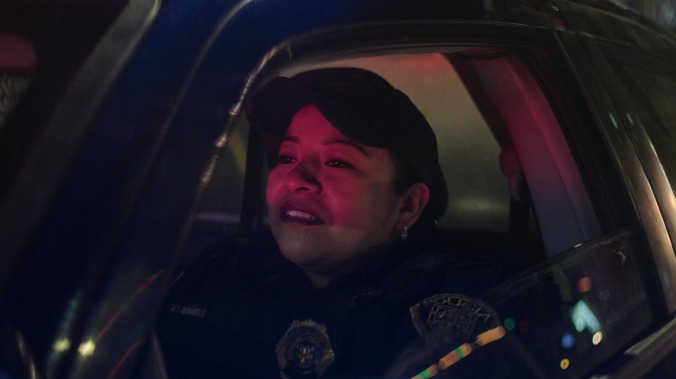It’s clear that something isn’t quite right from the very first sequence in Alonso Ruizpalacios’ A Cop Movie. The film opens with Teresa, a Mexico City police officer, in her car responding to a call from a pregnant woman in labor. Ruizpalacios’ static camera, which is placed firmly on the dashboard of her vehicle, surveys the streets as she drives to her destination. When she arrives on the scene, she quickly learns that the woman in question can’t make it to the hospital, in part because the ambulance her family desperately needs won’t arrive in time. Teresa quickly realizes what she has to do.
However, as soon as Teresa exits the car to personally help the woman deliver her child, the camera no longer remains strictly observational. Ruizpalacios stays with Teresa’s perspective, but he assumes a more blatantly cinematic mode, employing slick long takes, action cuts, and immersive close-ups that break hard with nonfiction conventions. For its first few minutes, A Cop Movie looks like a straightforward ride-along documentary about a Mexico City cop on duty. But it quickly reveals itself to be something different, and this opening rug pull comes to define Ruizpalacios’ genre-bending feature.
After the opening credits, which sport a funky theme song that could easily soundtrack a cop procedural from the ’70s, A Cop Movie follows Teresa as she patrols the streets, responding to various calls and killing time. As Ruizpalacios chronicles her routine, Teresa tells her origin story in voice-over—how she defied her father, a retired officer himself, by signing up for the academy when she was 17 and eventually won his respect after joining the force. Ruizpalacios contrasts Teresa’s voice-over, which feels very real in its ordinariness, with the glossy polish of the camerawork, which consciously feels like it’s aping a variety of action films from the past few decades.
A Cop Movie then shifts perspectives to another officer who goes by “Montoya,” and documents his experiences in the same district, with the same voice-over approach to his backstory. (He discusses how he was inspired by his brother to join the force and how the focus of police work pulled him out of a depressive, alcoholic spiral sparked by a break-up.) Ruizpalacios eventually brings the two together by revealing that Teresa and Montoya are a couple who fell in love as partners. They traverse the streets together (their colleagues affectionately refer to them as “The Love Patrol”), committed to both their jobs and each other. The visual style remains sleek, with scenes that resemble reenactments and flashbacks to crucial moments from Teresa’s and Montoya’s respective pasts. A Cop Movie just might be blending fiction and non-fiction.
After almost an hour, Ruizpalacios drops the other shoe, and though we won’t reveal the twist here, it’s pretty easy to guess the nature of it. (It’s also on the film’s IMDB page for all to see.) To his credit, Ruizpalacios doesn’t go to enormous lengths to conceal his intentions. But A Cop Movie revels in shifting the ground underneath the audience’s feet with various “surprises” that never feel all that surprising. Furthermore, it’s first half just isn’t that interesting—while Teresa’s and Montoya’s journeys to the force are sympathetic and plausible, they’re not exactly compelling. And though it draws the eye (especially during a harrowing shootout scene filmed from afar), the film’s stylized, intentionally derivative look wears out its welcome. So much of A Cop Movie feels like prelude, ramping up to a reveal that will finally push the film in another, possibly more interesting direction.
That moment does arrive, but it doesn’t quite deepen A Cop Movie. The film’s second half examines rampant normalized corruption in the Mexico City police force, shining a different light on the various bribes that Teresa and Montoya casually take in the first half. It also explores the thin (blue) line between performance and reality that’s part and parcel with being a cop—how wearing a uniform ultimately means playing a role. It hardly counts as a fresh insight that this kind of playacting, combined with the high stakes of the job, inevitably leads to casual malfeasance and violence.
A Cop Movie has yet another reveal in store for its final stretch that eventually clarifies every question raised by the film while also interrogating how morally bankrupt institutions will weed out honest people in order to maintain an unequal status quo. This section might be the strongest in the film, yet it’s too brief and comes too late to have much impact. It’s not Ruizpalacios’ fault that A Cop Movie isn’t the first film to play with documentary standards to serve a deeper truth, nor that it isn’t the first to examine systemic corruption. But aside from the Mexico City setting, it doesn’t really accomplish anything unique either. A Cop Movie feels in the end like, well, a cop movie, only with an eye for society instead of the unit. That’s not enough to separate it from the pack.


 Keep scrolling for more great stories.
Keep scrolling for more great stories.
